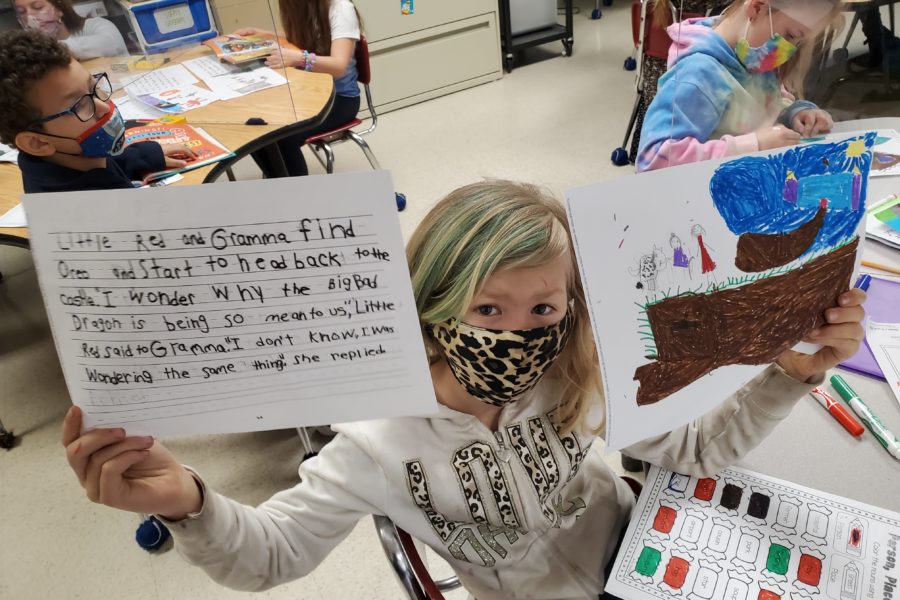
Writing is an essential life skill. In our digital world, written communication is more important than ever. Without a doubt, your child’s future education and employment will require some form of writing, whether it’s on tests/exams, essays/papers, or emails, copy, and reports. There’s no doubt that your child will use their writing skills for the rest of their lives.
Writing is also a great way to exercise the imagination, destress, and find a positive creative outlet. So, how can you help your child improve their writing skills?
- Give them books. Make sure they always have access to lots of diverse books. The more they read, the better writer they’ll become. Encourage them to analyze what they’re reading by asking open-ended questions: What did you like about it? Why? Why is this good/not good? What did you like about the characters? And point out the language, sentence structure, and style of stories or poems they like and which they may want to emulate. Visit the library and/or your local independent bookstore often and encourage diverse books of all genres, topics, styles, characters, and authors.
- Give them a journal or notebook to jot down ideas. You can find notebooks for about a dollar at your local grocery store. Encourage them to keep their notebook with them as often as possible and write down ideas as they come to them. Encourage them to write down their feelings (and know they don’t have to share it with anyone).
- Make writing a regular activity. If they’re going on and on about an idea or a story, encourage them to write it down. Suggest you both write for fifteen minutes, or twenty, or whatever you can do, then share your work with each other. You could keep a shared journal of all the fun things you’re doing this summer or your favorite foods or other things about summer.
- Encourage fan fiction or writing in the style of their favorite authors. Ask them to write a sequel or an alternate ending to a book they love.
- Encourage them to write a letter to their favorite author. They may even hear back!
- Ask what they’re writing about. Ask lots of questions to show how you’re interested in and support their work and ideas.
- Ask to read their work. Tell them you’d love to read what they’ve been writing, when they’re ready. They’ll (probably) try really hard to put their best work together for you. First, tell them what you loved – their imagination and creativity, their language or humor or whatever they’re great at. You can also tell them how it reminds you of one of their favorite authors. Then, you can offer constructive feedback about what they could improve. Remember to make clear that writing can always be improved and you want to help them make their ideas even sharper and stronger. No matter what level of writing you’re at, you can always get better. Be specific in your suggestions and remind them that these are just your suggestions and others might have a different opinion, and that they’re ultimately the author who gets to decide.
- Encourage a writing group with their friends/siblings/cousins/neighbors. One of the best ways to become a better writer is to read critically. Read as much as you can and analyze how the writer’s doing what they’re doing and what they might do even better. Suggest your child get together with other kids to share stories, poems, whatever, and discuss them. An adult should be present to make sure the group’s discussion is positive and helpful. Ask questions, such as what did you like about this piece? How could the author make it even better?
Like with anything, good writing comes with practice, and summer’s a great time to practice writing. Plus, it’s fun and a good way to keep you connected to your child and help them create more opportunities for themselves.
The Most Common Writing Mistakes
As an editor and writing teacher, I see a lot of writing pitfalls, even in the college and adult writers with whom I work. As you encourage your child to write and improve their work, here are some common things to look out for.
–Rambling. This happens at every age and level. Some writers just go on…and on…and on. You’ll lose your audience, whether it’s a novel or an email. Keep it short and to-the-point. As my dad used to say, “Land the plane.”
–Too much telling. There’s a classic writer’s idiom: Show, don’t tell. To drive this home, I often tell my students Anton Checkhov’s quote: “Don’t tell me the moon is shining, show me the glint of light on broken glass.” (Right?) This is especially true of fiction, but really, all kinds of writing can be over-explained with too much summary. This happened, then this happened, then that happened. It gets boring. Just show us what you mean. Give examples.
–It’s vague or overgeneralized. Good writing is specific. That’s true, I believe, with all forms of writing. Give me details. Show me. Don’t make big, sweeping claims you can’t back up with evidence or examples.
–Spelling and grammar. This really does matter. In the literary world, sloppy copy will get rejected, even if it’s otherwise good. I see a fair number of young adult and adult students submit pieces that are riddled with errors, which makes it hard to read and understand. Spellcheck doesn’t catch everything, so try to (gently) hammer home good grammar and spelling early.
–Unnecessary words/phrases or cliches. Beginner writers tend to use A LOT of adverbs and adjectives. Most of the time, they don’t need nearly that many. As Stephen King said, “The road to hell is paved with adverbs.” Encourage them to tighten up the writing as much as they can, cutting anything that can be deleted without changing the meaning. And, try to discourage the overuse of cliches in favor of something a little more original.
–Unclear communications. I work with young adults and adults on writing their first books and I often come across writing that, when I get to the end of it, I have no idea what I was supposed to take away. What’s the point here? I’ll wonder. Maybe they crammed a bunch of interesting ideas and quotes and stuff in there, but was there a clear central thread? Did it go somewhere or just kind of fizzle out? Did you learn something? Even if the language is sophisticated and beautiful and the writer is clearly smart, if the intended audience or average reader doesn’t get what the heck they’re talking about, the writing isn’t very effective.
Remember to be encouraging while steering them away from some of these pitfalls. Put a positive spin on it: I love when you gave all those details about XYZ, it would be great if you could do more of that. Use the ol’ compliment sandwich: Something you love, something that could be improved, something else you love. The important thing is to encourage their creative expression and communications skills, not discourage them.
Writing is everything. And, this summer, you can have fun while helping your kids hone those all-important writing skills.



